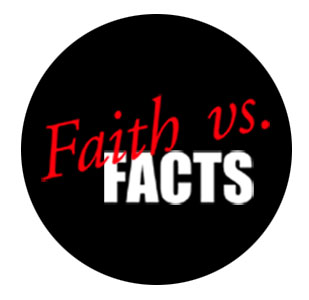
MENU

Faith vs. Facts
One of the most logical questions that comes to everyone’s mind is, “If macroevolution is not true, why do the majority of scientists say they believe it?” The answer is simply that they have decided that truth is not their goal. As a fundamental tenet of their worldview, evolutionists have chosen to believe that God is not an option, even if He is where the evidence leads. Put another way, all explanations for origins must be purely materialistic—even if they are illogical.
Unfortunately, the general public still tends to think of scientists as people who stick with the facts. But scientists, though sometimes professing otherwise, will ignore the facts if they hold a personal bias on the interpretation of a body of evidence. The more knowledgeable the evolutionary scientist, the more conscious he is that his belief in evolution is based on faith, usually the faith that there is no God, not an honest evaluation of the facts.
A statement by D.M.S. Watson in Nature magazine, supports the idea that scientists are biased. He called macroevolution “a theory universally accepted not because it can be proved by logically coherent evidence to be true but because the only alternative, special creation, is clearly incredible.”1
Darwin himself expressed an irrational faith in his theory despite the clear evidence to the contrary. In The Origin of Species, he wrote, “To suppose that the eye . . . could have been formed by natural selection, seems, I freely confess, absurd in the highest possible degree.”2 Darwin did describe the concept of human eye evolution as seemingly “absurd,” but his philosophical commitment to his worldview caused him to accept natural selection as an adequate explanation even though he lacked any reasonable evidence.
Nobel prize-winning biologist, Dr. George Wald, explains the position in which many scientists find themselves:
One only has to contemplate the magnitude of this task to concede that the spontaneous generation of a living organism is impossible. [Nevertheless, he says,] The reasonable view was to believe in spontaneous generation; [because] the only alternative, [was] to believe in a single, primary act of supernatural creation. There is no third position. For this reason many scientists a century ago chose to regard the belief in spontaneous generation as a philosophical necessity . . . Most modern biologists, having viewed with satisfaction the downfall of the spontaneous generation hypothesis, yet unwilling to accept the alternative belief in special creation, are left with nothing.3 (emphasis added)
Canadian scholar Arthur C. Custance (Ph.D., anthropology), author of the ten-volume Doorway Papers, has this to say about macroevolution and its nearly universal acceptance:
Evolutionary philosophy has indeed become a state of mind, one might almost say a kind of prison rather than a scientific attitude . . . . To equate one particular interpretation of the data with the data itself is evidence of mental confusion . . . . The theory of evolution . . . is detrimental to ordinary intelligence and warps judgement.
He concludes:
In short, the premises of evolutionary theory are about as invalid as they could be . . . . If evolutionary theory was strictly scientific, it should have been abandoned long ago. But because it is more philosophy than science, it is not susceptible to the self-correcting mechanisms that govern all other branches of scientific inquiry.4
Christians are often accused of holding to their belief system because of a “blind” faith. Those who say this mean that Christians are irrational—willing to hold to their beliefs even if they contradict reality. However, unless a person has already decided against it, Christianity, when correctly understood, is the only belief system available that, as C.S. Lewis puts it, “faces all the facts.”5 Evolutionism, on the other hand, is the very definition of a blind faith.

A Few of the Creationists Who Founded Modern Science:
Kepler - Astronomy
Pascal - Hydrostatics
Boyle - Chemistry
Newton - Physics
Faraday - Magnetic theory
Babbage - Computers
Agassiz - Ichthyology
Simpson - Gynecology
Mendel - Genetics
Pasteur - Bacteriology
Kelvin - Thermodynamics
- D.M.S. Watson, “Adaptation,” Nature, Vol. 123 (1929), p. 233, as quoted in Morris, Henry M., ed. Scientific Creationism. (El Cajon, CA: Master Books, 1985), p. 8.
- Charles Darwin, The Origin of Species, first edition reprint (New York: Avenel Books, 1979), p. 217, as quoted in Taylor, Paul S. The Illustrated Origins Answer Book (Mesa, Arizona: Films For Christ Association, 1989), p. 87.
- John Ankerberg and John Weldon, The Facts on Creation vs. Evolution (Eugene, OR: Harvest House, 1993), pp. 15-16.
- Arthur C. Custance, “Evolution: An Irrational Faith,” Evolution or Creation? Vol. 4—The Doorway Papers (Grand Rapids, MI: Zondervan, 1976), pp. 173-74, as cited in Ankerberg and Weldon, p. 11.
- C.S. Lewis, Mere Christianity (New York, NY: Macmillan Publishing Company, 1952), pp. 48, 49.
Design, graphics and artwork copyright © 2016 Tim Beasley • All rights reserved.